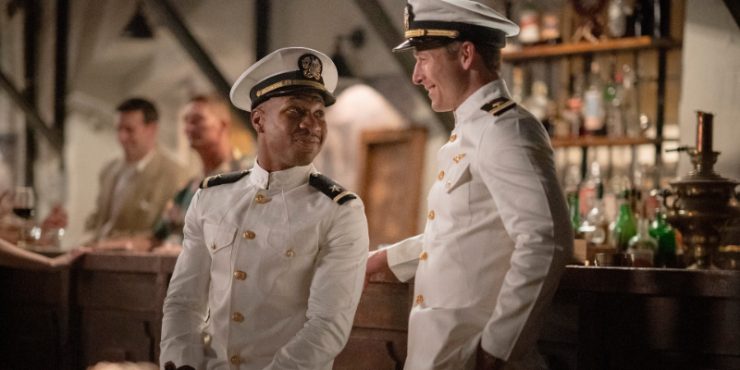2022 has been a historically lucrative year for naval aviation dramas. Well, for one movie anyway. Top Gun: Maverick has made over a billion dollars worldwide since its release on Memorial Day weekend, a triumph that felt like something between a comeback story for the movie theater industry and a swan song for a bygone era. If many hoped that Maverick was a harbinger of success for future blockbusters, they would be sorely disappointed just a few months later. Over Thanksgiving weekend, we got Devotion, a better-than-solid historical drama that is also about naval aviators. Devotion is based on a true story and is embedded with actual political stakes, something that Maverick deliberately (almost childishly) avoids. You’d think Devotion would benefit from a halo effect of Maverick‘s gargantuan success, but that has proven not to be the case.
Now, it’s not really a fair comparison. Maverick was a widely-anticipated legacy sequel with a release delayed several years due to the COVID-19 Pandemic. It also starred Tom Cruise who in an era where we’ve all but decided that the movie star is dead, he showed himself to be the exception that proves the rule. Cruise’s movie stardom is a relic but it’s still potent. There are remnants of it in Sandra Bullock in The Lost City, Brad Pitt in Bullet Train, and then George Clooney and Julia Roberts in Ticket to Paradise – all lackluster to bad movies that still managed to be legitimate financial successes, albeit on a more modest level than Maverick. Cruise and Pitt and Bullock can, it seems, still open a movie. So why can’t Jonathan Majors? A remarkably talented actor who already has a Marvel character on the books and has proven to have the goods? Why can’t Glen Powell? Another young talent who was actually one of the better supporting performances in Maverick?
The question (why gray-haired 20th Century movie stars can still rake in money while earnest newcomers can’t seem to break through) truly rattles me, and it will rattle you as well if you see Devotion, a film that soothes and satisfies in every way you’d want from a studio film. Its aviation sequences may not be as death-defying as Maverick, but they still pop with excitement and suspense. It’s story, about the friendship between Ensign Jessie Brown (Majors) and Lieutenant Tom Hudner (Powell), smacks of the moralizing, Ebony & Ivory tales of 1960’s Hollywood. Devotion will defy expectations in some ways while proving ornately formulaic in others. It never sticks its neck out too far when it comes to the US military’s less-than-stellar record with race relations, but it never feels like cheap recreation either. It hits the meat on the bat so sweetly that you’d be sure you were watching the highest grossing movie of 2005.
That sounds catty but the truth is that the audiences who are skipping out on Devotion right now are missing the thing that lots of audiences claim to want: a compelling drama with sympathetic characters and major stakes. Majors’ Jesse is the first Black aviator in the Navy in 1950. By the time Tom arrives, Jesse’s reputation is a bit mixed. His talent in a plane is undeniable, but his bedside manner leaves something to be desired. Tom doesn’t have to ask why Jesse is embittered against the world, and the fact that he doesn’t ask is both the reason their friendship grows and the source of numerous tensions. Both Jesse and Tom missed out on the glory of World War II, but a conflict between North and South Korea plans to entangle the US, giving the two men the chance to earn their stripes. As it unfolds, I was struck by the realization that, if this were a limited series on Apple TV, it might be the most talked about show in America.
There is an element of predictability in Devotion‘s script (written by Jake Crane and Jonathan A. Stewart), but of course the hook of the film is its thrilling airplane sequences, which director J.D. Dillard crafts wonderfully. I found myself profoundly moved by the chemistry between Majors and Powell, whose characters never truly rise above lionized true-life figures, but who become something captivating by the strength of their commitment. Majors’ part is more substantive, but he’s a generous enough performer to share his duties with Powell, who in turn is willing to do the same. You watch Devotion and you’re struck by their performances and how they raise the quality of what you’re watching. That seems, to me, to be the very definition of a movie star. I hope that audiences will realize this for themselves.
Directed by J.D. Dillard










